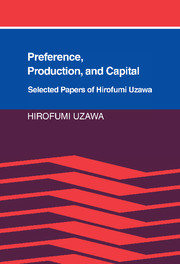Book contents
11 - Walras's Existence Theorem and Brouwer's Fixed-Point Theorem
Published online by Cambridge University Press: 04 May 2010
Summary
Introduction
The purpose of this note is to show the equivalence of two fundamental theorems – Walras's Existence Theorem on the one hand and Brouwer's Fixed-Point Theorem on the other.
Walras's theorem is concerned with the existence of an equilibrium in the Walrasian system of general equilibrium and has been a problem of some importance in formal economic analysis since his work appeared in 1874–7. It was, however, not until Wald's contributions, and, that the existence problem was rigorously treated. Recent contributions, in particular those of Arrow and Debreu, McKenzie, Nikaidô, and Gale, have shown that Walras's theorem is essentially a necessary consequence of Brouwer's Fixed-Point Theorem. The latter theorem, first proved by Brouwer in 1911, also bears a fundamental importance in mathematics. It may be hence of some interest to see that Brouwer's theorem is in fact implied by Walras's theorem. It would indicate the reason that the general treatment of the existence problem in the Walrasian system had to wait for the development of the twentieth century mathematics.
Walras's Existence Theorem
According to Gale and Nikaidô, Walras's theorem may be formulated as follows.
Let there be n commodities, labeled 1, …, n, p = (p1, …, pn) and x = (x1, …, xn) be a price vector and a commodity bundle, respectively. Price vectors are assumed to be nonzero and nonnegative; commodity bundles are arbitrary n-vectors.
- Type
- Chapter
- Information
- Preference, Production and CapitalSelected Papers of Hirofumi Uzawa, pp. 175 - 178Publisher: Cambridge University PressPrint publication year: 1989
- 3
- Cited by



